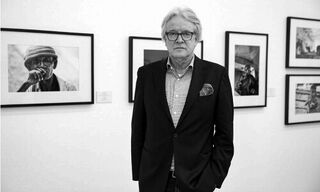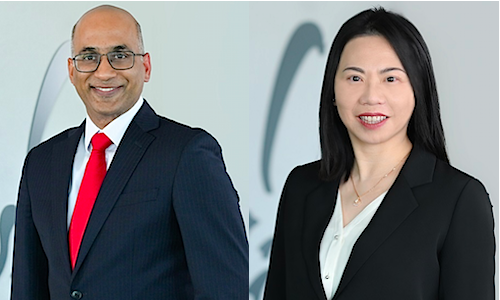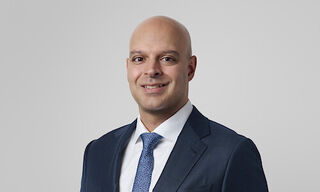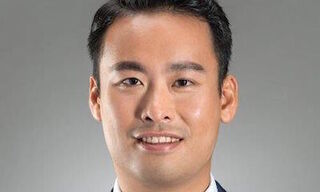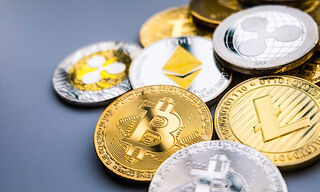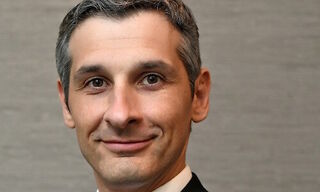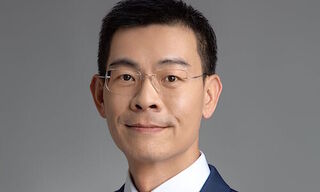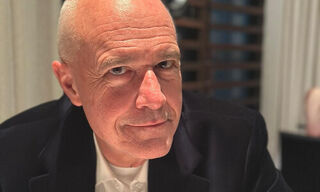After the fierce battles that swept across Hong Kong for months, it is an entirely different beast that has Asia in its grip this year. finews.asia Chief Executive Claude Baumann on life behind a mask, the ideal temperature and optimism instilled by frequent washing of hands.
This article is published on finews.first, a forum for authors specialized in economic and financial topics.
How fast things can be turned upside down. Nobody knows whether to shake hands anymore. An awkward smile has taken its place. The idea of being infected with the coronavirus, or so-called COVID-19, by somebody you know is pretty painful – but the possibility is there.
With the number of infections and deaths from the disease rising every day, the feeling of insecurity is growing. I’m not talking about Wuhan or China but of Singapore – Asia's answer to Switzerland. Here, authorities are registering the spread of the infectious disease with their habitual thoroughness. And that’s a good thing of course because we know about the dangers and the infection risk.
«Fear can do more harm than the virus itself»
But it also stokes fears. The government is aware of this and keen to keep the state of emergency under control. «Keep calm and carry on» is what it keeps telling its citizens and a few days ago, in a bid to prevent an outbreak of collective panic, Prime Minister Lee Hsien Loong said: «Fear can do more harm than the virus itself.»
The intervention by the prime minister was more than opportune. Because as a short while later the number of cases in Singapore surpassed the ones in Hong Kong and the government increased the alarm level to orange, the second-highest, it didn’t take long before food stores reported panic buying.
«How do you get to know someone during an epidemic?»
The authorities again were forced to respond and assured the general public that there were no shortages of rice, noodle soups or toilet paper. The Monetary Authority of Singapore, or MAS, went out with an appeal to the country’s banks to stock up cash dispensers with plenty of cash and to keep sufficient amounts of money at their branches across the city.
And still, things have changed a lot. People are leaving their homes less frequently – «social distancing» is the term used to describe how people are reacting. While normally the streets and malls of Singapore are awash with people, today they are almost empty. And traffic is not as dense as it used to be.
«Countless business meetings are canceled»
Many employees work from home after companies reported cases of infected staff. DBS, Singapore's largest bank, evacuated more than 300 of their bankers from the financial district after one employee tested positive and also canceled the annual media conference – a webcast was organized in its stead.
Countless business meetings are canceled at short notice. People are conducting telephone- and video-conferences instead of meetings in person. Credit Suisse canceled the annual philanthropy forum in the recently refurbished Raffles Hotel and at least 100 exhibitors of the annual, popular Singapore Air Show stayed away.
«How are you feeling today?»
If you wish to visit an office tower in downtown Singapore, you need to come well in advance of the agreed time because you have to pass stringent and time-consuming entry controls. Answers are requested for questions such as: How are you feeling today? Have you been to China in the past two weeks? Is a family member sick?
Forms need filling in and the temperature is being taken (pictured below). In some restaurants or tower blocks, you receive a small sticker that confirms your safe bill of health.

Business is affected as a consequence. With tourists staying away and business travelers delaying their trips, turnover is down by as much as 80 percent. Restaurants are grateful for any guest that ventures to their premises – and the service is much better as a consequence.
«Singaporeans love their artificial chill, the embodiment of luxury and affluence»
China’s year of the rat has gotten off to a bad start for sure. It is a worry that people were infected who had never been to China. The virus has assumed its own dynamic. And still, even doctors can’t agree on how much the omnipresent facial masks can help in preventing the spread. Should you carry one if you are well? Of course, a mask acts as an insurance policy against being infected by accident – the virus is spread via droplets of bodily fluids.
Because the virus thrives in dry and cool conditions, Singapore has urged citizens to turn off their air-conditioning and to open their windows instead. This is the exact opposite of what the people here are used to doing – they love their artificial chill, the embodiment of luxury and affluence. Today, taxis no longer are so cold that Western Europeans hesitate to use them. But better wear a mask while you ride.
«We have overcome so many crises, we will also cope with the coronavirus»
Scientists are saying that the high-point for new infections will be reached at the end of February. After that point, things ought to improve and in any case, not all the infected are dying. Some are making a full recovery. So is it optimists only who claim that the epidemic will be over in three or four months? Back to business as usual so to speak? They already talk of a recovery that will be all the steeper after the dent left by COVID-19. Yin and yang – a crisis treated as an opportunity.
«Historically, we’ve overcome so many crises that we will also cope with coronavirus,» a citizen of Singapore said while spraying his hands with disinfectant available at all major tower blocks. «At the moment, we can’t do much more,» he says smiling gently, entering the lift that will take him to the 62nd floor.
Claude Baumann is the co-founder and CEO of finews.ch and finews.asia, which is based in Singapore. Previously, he wrote for «Weltwoche» and «Finanz und Wirtschaft». He also co-founded the publisher Nagel & Kimche and launched business travel magazine «Arrivals». He is the author of several books on the banking industry.
Previous contributions: Rudi Bogni, Peter Kurer, Oliver Berger, Rolf Banz, Dieter Ruloff, Werner Vogt, Walter Wittmann, Alfred Mettler, Peter Hody, Robert Holzach, Craig Murray, David Zollinger, Arthur Bolliger, Beat Kappeler, Chris Rowe, Stefan Gerlach, Marc Lussy, Nuno Fernandes, Richard Egger, Maurice Pedergnana, Marco Bargel, Steve Hanke, Urs Schoettli, Ursula Finsterwald, Stefan Kreuzkamp, Oliver Bussmann, Michael Benz, Peter Hody, Albert Steck, Martin Dahinden, Thomas Fedier, Alfred Mettler, Brigitte Strebel, Peter Hody, Mirjam Staub-Bisang, Nicolas Roth, Thorsten Polleit, Kim Iskyan, Stephen Dover, Denise Kenyon-Rouvinez, Christian Dreyer, Kinan Khadam-Al-Jame, Robert Hemmi, Anton Affentranger, Yves Mirabaud, Katharina Bart, Frédéric Papp, Hans-Martin Kraus, Gerard Guerdat, Mario Bassi, Stephen Thariyan, Dan Steinbock, Rino Borini, Bert Flossbach, Michael Hasenstab, Guido Schilling, Werner E. Rutsch, Dorte Bech Vizard, Adriano B. Lucatelli, Katharina Bart, Maya Bhandari, Jean Tirole, Hans Jakob Roth, Marco Martinelli, Thomas Sutter, Tom King, Werner Peyer, Thomas Kupfer, Peter Kurer, Arturo Bris, Frederic Papp, James Syme, Dennis Larsen, Bernd Kramer, Ralph Ebert, Armin Jans, Nicolas Roth, Hans Ulrich Jost, Patrick Hunger, Fabrizio Quirighetti, Claire Shaw, Peter Fanconi, Alex Wolf, Dan Steinbock, Patrick Scheurle, Sandro Occhilupo, Will Ballard, Michael Bornhaeusser, Nicholas Yeo, Claude-Alain Margelisch, Jean-François Hirschel, Jens Pongratz, Samuel Gerber, Philipp Weckherlin, Anne Richards, Antoni Trenchev, Benoit Barbereau, Pascal R. Bersier, Shaul Lifshitz, Klaus Breiner, Ana Botín, Martin Gilbert, Jesper Koll, Ingo Rauser, Carlo Capaul, Claude Baumann, Markus Winkler, Konrad Hummler, Thomas Steinemann, Christina Boeck, Guillaume Compeyron, Miro Zivkovic, Alexander F. Wagner, Eric Heymann, Christoph Sax, Felix Brem, Jochen Moebert, Jacques-Aurélien Marcireau, Peter Hody, Ursula Finsterwald, Claudia Kraaz, Michel Longhini, Stefan Blum, Zsolt Kohalmi, Karin M. Klossek, Nicolas Ramelet, Søren Bjønness, Lamara von Albertini, Andreas Britt, Gilles Prince, Fabrizio Pagani, Darren Willams, Salman Ahmed, Stephane Monier, and Peter van der Welle, Beat Wittmann, Ken Orchard, Michael Welti, Christian Gast, Didier Saint-Georges, Jeffrey Bohn, Juergen Braunstein, Jeff Voegeli, Gérard Piasko, Fiona Frick, Jean Keller, Stefan Schneider, Matthias Hunn, Andreas Vetsch, Fabiana Fedeli, Claude Baumann, Marionna Wegenstein, Kim Fournais, Carole Millet, Ralph Ebert, Lars Jaeger, Swetha Ramachandran, Brigitte Kaps, Thomas Stucki, Teodoro Cocca, and Neil Shearing.















